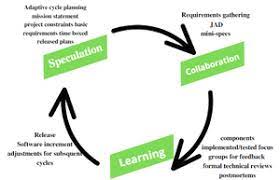The Importance of Software Project Management in Software Engineering
Software project management plays a crucial role in the success of software engineering projects. It involves planning, organizing, and overseeing the development of software applications from inception to completion. Effective project management ensures that projects are delivered on time, within budget, and meet the desired quality standards.
Key Aspects of Software Project Management
Planning: The first step in software project management is thorough planning. This involves defining project goals, scope, timelines, resources required, and potential risks. A well-defined plan sets the foundation for successful project execution.
Resource Allocation: Assigning the right resources to tasks is essential for efficient project management. Project managers must ensure that team members have the necessary skills and tools to complete their assigned tasks effectively.
Risk Management: Identifying and mitigating risks is a critical aspect of software project management. Proactively addressing potential challenges helps minimize disruptions and ensures that projects stay on track.
Communication: Effective communication is key to successful project management. Regular updates, meetings, and feedback loops help keep all stakeholders informed and involved throughout the project lifecycle.
The Role of Project Managers in Software Engineering
Project managers play a central role in overseeing software engineering projects. They are responsible for coordinating team efforts, monitoring progress, resolving conflicts, and ensuring that projects are delivered according to specifications.
A skilled project manager possesses strong leadership qualities, excellent communication skills, and a deep understanding of software development processes. By leveraging their expertise, project managers can guide teams towards achieving project goals efficiently and effectively.
The Benefits of Effective Software Project Management
Effective software project management offers numerous benefits to organizations, including:
- Better control over project timelines and budgets
- Improved collaboration among team members
- Enhanced quality assurance processes
- Increased stakeholder satisfaction
Understanding Software Project Management: Key Questions and Insights
- What is software project management in software engineering?
- Why is software project management important in software engineering?
- What are the key aspects of software project management?
- What role do project managers play in software engineering projects?
- How can risks be managed in software project management?
- What are the benefits of effective software project management?
What is software project management in software engineering?
Software project management in software engineering refers to the systematic planning, coordination, and control of software development projects to ensure their successful completion. It involves defining project goals, allocating resources, managing risks, and maintaining communication among team members and stakeholders throughout the project lifecycle. Software project management plays a critical role in guiding teams towards delivering high-quality software products on time and within budget. By implementing best practices and methodologies, project managers help streamline the development process, optimize resource utilization, and mitigate potential challenges to achieve project success.
Why is software project management important in software engineering?
Software project management is crucial in software engineering for several reasons. It helps ensure that projects are completed within the specified timeframes and budget constraints, minimizing the risk of delays and cost overruns. Effective project management also facilitates better coordination among team members, leading to improved collaboration and productivity. By implementing sound project management practices, software engineering teams can mitigate risks, address issues proactively, and deliver high-quality software solutions that meet client requirements. Ultimately, software project management plays a vital role in driving the success of software development projects by providing structure, guidance, and oversight throughout the project lifecycle.
What are the key aspects of software project management?
One of the most frequently asked questions in software project management in software engineering is, “What are the key aspects of software project management?” The key aspects of software project management include thorough planning, resource allocation, risk management, and effective communication. Planning involves defining project goals, scope, timelines, resources required, and potential risks. Resource allocation ensures that the right resources are assigned to tasks to complete them efficiently. Risk management involves identifying and mitigating risks to minimize disruptions. Effective communication is essential for keeping all stakeholders informed and involved throughout the project lifecycle. Mastering these key aspects is crucial for successful software project management in software engineering.
What role do project managers play in software engineering projects?
Project managers play a crucial role in software engineering projects by overseeing the entire project lifecycle from planning to execution. They are responsible for setting project goals, allocating resources, managing timelines, and ensuring that projects are delivered on time and within budget. Project managers act as liaisons between stakeholders, development teams, and other key players, facilitating communication and collaboration. Their leadership and decision-making skills help navigate challenges, mitigate risks, and drive the successful completion of software projects while maintaining quality standards. Ultimately, project managers play a pivotal role in ensuring the overall success and effectiveness of software engineering projects.
How can risks be managed in software project management?
In software project management, managing risks is a critical aspect to ensure the successful delivery of projects. Risks in software projects can arise from various factors such as changing requirements, resource constraints, technical challenges, and external dependencies. To effectively manage risks, project managers employ strategies such as risk identification, assessment, mitigation, and monitoring. By proactively identifying potential risks early in the project lifecycle, developing mitigation plans to address them, and continuously monitoring and adjusting strategies as needed, project teams can minimize the impact of risks on project outcomes. Effective risk management in software project management helps teams anticipate challenges, make informed decisions, and ultimately increase the likelihood of project success.
What are the benefits of effective software project management?
Effective software project management brings a multitude of benefits to organizations embarking on software engineering projects. By implementing robust project management practices, teams gain better control over project timelines and budgets, ensuring that deliverables are completed on schedule and within budget constraints. Improved collaboration among team members fosters a cohesive working environment, enhancing communication and productivity. Furthermore, effective software project management facilitates rigorous quality assurance processes, leading to the delivery of high-quality software products that meet or exceed client expectations. Ultimately, stakeholders experience increased satisfaction as projects are successfully executed with efficiency and precision.




